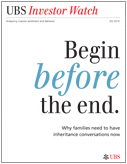NEW YORK--(BUSINESS WIRE)--UBS Wealth Management Americas (WMA) today released its quarterly UBS Investor Watch report, exploring the issues around inheritance and why families avoid the topic. The survey of over 2,800 high net worth (HNW) and affluent U.S. investors found that while both benefactors1 and heirs2 are optimistic about giving and receiving inheritance, neither is actively engaged in inheritance planning and are reluctant to fully discuss this topic before a death in the family occurs. As a result, almost half (46%) of benefactors have not discussed their inheritance plans with their children. With an estimated $40 trillion of personal wealth expected to change hands by 20503, there is a lot at stake and a lot to talk about.
Top barriers to the inheritance conversation
With benefactors not wanting to divulge their wealth and heirs being afraid or unwilling to raise the topic, the inheritance conversation is one of the most important family discussions that does not take place. For those leaving an inheritance, their top three barriers to discussion are:
- It doesn't feel like a pressing issue (43%),
- They don’t want their offspring to count on the inheritance (32%), and
- They don’t want their children to feel entitled to wealth (27%).
Three in four benefactors also view it as highly important that their children use their inheritance wisely and don’t squander it.
For those on the receiving end of a potential inheritance, their top barriers are:
- Their families don’t talk openly about financial issues (46%),
- It does not feel like a pressing issue (31%), and
- They do not want to appear greedy (23%).
UBS Investor Watch found that even though wealthier benefactors have planned more around inheritance they are no more likely than less affluent investors to have discussed these plans with their future heirs. They are more likely to have an up-to-date will and to have put a wealth transfer plan in place, but they are still not talking about the plans with their heirs. Therefore their heirs are no more likely to know the details of the inheritance plans and are left unprepared when a parents pass. Even with more wealth at stake, emotional barriers hold back open discussions between benefactors and their heirs.
"Inheritance can be a complex and sensitive issue for both sides, parents don’t want to talk about mortality and children don’t want to appear greedy by bringing it up," said Paula Polito, Client Strategy Officer, UBS Wealth Management Americas. "But the fact of the matter is that it’s a conversation that needs to be had among families. Open lines of communication and advance planning are critical to ensuring a smooth transfer of wealth and to preventing future conflict among heirs."
Embracing the conversation
While it may not be an easy conversation to have, talking openly about inheritance planning has a tremendous impact on heirs’ satisfaction with the wealth transfer process and lowers the likelihood of disagreements among surviving family members.
When heirs know the details of the inheritance plan ahead of time – i.e., they have seen the will, know approximately how much wealth there is, how it will be divided and where the assets are – they are much more satisfied with the inheritance process (89%). Additionally, when heirs do not know the details ahead of time they are more than twice as likely (27% vs. 12%) to disagree with family about the inheritance distribution.
The situation is even worse when there is an unresolved issue, such as who is going to inherit the family home, prior to a parent's passing. In these cases, satisfaction among heirs plunges, and the likelihood of disagreements about the inheritance distribution skyrockets (82% vs. 11%). Sensitive issues like deciding the fate of the family home may not be simple to resolve prior to a parent's passing, but it will only be more complicated after they pass without clarifying their intentions on inheritance.
Regarding blended families (2nd marriages involved), where disagreements among heirs are more common (27% vs. 15% for nuclear families) and satisfaction with the distribution process is lower (56% vs. 83% for nuclear families), having the conversation is even more important.
Giving while living
Most benefactors prefer to begin passing on wealth to their heirs while living, as opposed to posthumously. Four out of five benefactors have provided financial support to their adult children, and nearly a quarter have set up trust funds for their children (23%). Benefactors pass on wealth to adult children while living for a wide variety of reasons, including financial need (51%) and a desire to see their children succeed (47%).
The desire to give while living creates an added layer of complexity to inheritance planning. Benefactors must determine how much financial support they can provide to their heirs while facing an uncertain lifespan, while considering the impact of healthcare costs on savings. This uncertainty about longevity and potentially outliving one's assets acts as a barrier to inheritance discussions. A significant portion of investors are highly concerned about being able to afford long-term care (23%, the highest of all personal finance concerns) and outliving their assets (13%).
Multiple generation giving
Longevity and a legacy are important to those leaving an inheritance. Nearly a quarter of benefactors with grandchildren plan to leave part of their inheritance directly to their grandchildren. For 43% of those benefactors, it's highly important that their assets last and are also able to support their grandchildren. Additionally, financial support to adult children while living is often done with the grandchildren in mind. The number one way parents financially support their adult children is by creating a college fund for their grandchildren. When asked why they financially support their adult children, parents are just as likely to want to ensure their grandchildren are set up to succeed (44%) as they are for their own children (47%).
New approach forward
The vast majority of heirs are grateful to their parents for what they've passed on to them and hesitant to criticize how their parents handled their inheritance planning. While only 1 in 3 say they wish their parents had done anything differently, that does not mean they themselves will do things the same way. Nearly three quarters of heirs (72%) said they plan to deal with inheritance differently than their parents.
“Each generation feels like they know more than the one that preceded them, so it is natural that heirs have different ideas about inheritance than their parents,” says Sameer Aurora, Head of Investor Insights for UBS Wealth Management Americas. “That said, they demonstrate stronger self-awareness as they trend towards greater transparency with their own potential heirs and planning for inheritance earlier. They don’t want to be caught off-guard or leave their own children in a state of uncertainty.”
Among the top ways heirs said they would diverge from their parents’ process of passing on their wealth are:
- Keep their will updated (47%),
- Disclose the whereabouts of all financial accounts (43%),
- Take steps to minimize taxes on their future heirs (34%),
- Proactively discuss wealth transfer plans openly with heirs (34%) and
- Plan ahead before the onset of aging or mental capacity issues (29%).
We invite you to read the full report here: www.ubs.com/investorwatch
About UBS Investor Watch
UBS Investor Watch is a quarterly publication analyzing the latest in investor sentiment and behavior. Dedicated to generating insights that help UBS Financial Advisors deliver exceptionally for their clients, UBS Investor Watch is the industry’s definitive guide to what’s on investors’ minds right now.
We invite you to read the full report.
Methodology
For this eighth edition of UBS Investor Watch, 2,882 U.S investors responded to our survey from June 24 – July 7, 2014. The core sample of 2,474 investors have at least $250,000 in investable assets; 1,121 have at least $1 million in investable assets. This UBS Investor Watch includes an oversample for Millennials:
- 528 Millennials: Respondents, ages 21-29, have at least $75,000 in household income or $50,000 in investable assets; respondents, ages 30-36, have at least $100,000 in household income or $100,000 in investable assets.
________________
1 Benefactors are parents of adult
children who expect they will have wealth to pass on
2
Heirs are adults who have already received an inheritance from at least
one parent
3 The Greater Wealth Transfer,
Capitalizing on the Intergenerational Shift in Wealth, Accenture,
2012.
Notes to Editors
About UBS Wealth Management Americas
UBS Wealth Management Americas provides advice-based relationships through financial advisors who deliver a fully integrated set of products and services specifically designed to address the needs of ultra-high net worth, high net worth and core affluent individuals and families. It includes the Wealth Management U.S. business, the domestic Canadian business and the international business booked in the United States.
About UBS
UBS draws on its 150-year heritage to serve private, institutional and corporate clients worldwide, as well as retail clients in Switzerland. Its business strategy is centered on its pre-eminent global wealth management businesses and its universal bank in Switzerland. Together with a client-focused investment bank and a strong, well-diversified global asset management business, UBS will drive further growth and expand its premier wealth management franchise.
UBS is present in all major financial centers worldwide. It has offices in 57 countries, with about 35% of its employees working in the Americas, 36% in Switzerland, 17% in the rest of Europe, the Middle East and Africa and 12% in Asia Pacific. UBS employs about 65,000 people around the world. Its shares are listed on the SIX Swiss Exchange and the New York Stock Exchange (NYSE).
Follow us on Twitter: @UBSAmericas




